In the early 1970s, Laura Tabbara taught senior English in Charleston, West Virginia. Half a century later, some of the students have formed a book club with 84-year-old Laura at the helm. Laura and members of the group share their inspiring story with BookBrowse.
We're so excited to share the story of your book club with BookBrowse readers. Laura, how did it all begin?
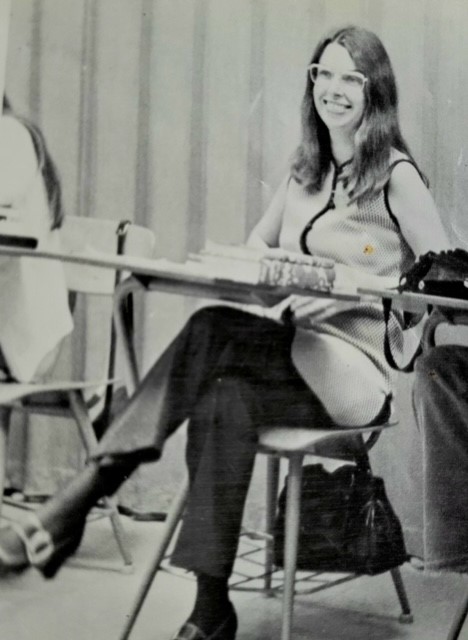 Laura: In the early 1970s—over 50 years ago—I taught Grade 12 English and a senior elective, Great Books, at George Washington High School in Charleston, West Virginia. GWHS was an innovative grades 10-12 high school of almost 1000 students where the heart of learning took place in small group seminars of maybe 15 students who sat in a circle with the teacher, actually looked at each other, and discussed the subject at hand.When a seminar really meshed, such as with the Class of '72, it was an experience like no other for both the students and the teacher.
Laura: In the early 1970s—over 50 years ago—I taught Grade 12 English and a senior elective, Great Books, at George Washington High School in Charleston, West Virginia. GWHS was an innovative grades 10-12 high school of almost 1000 students where the heart of learning took place in small group seminars of maybe 15 students who sat in a circle with the teacher, actually looked at each other, and discussed the subject at hand.When a seminar really meshed, such as with the Class of '72, it was an experience like no other for both the students and the teacher.
That sounds wonderful. What books did you discuss?
Laura: All seniors had to take English 12 so my team teachers and I knew them all; we covered The Canterbury Tales, Macbeth, modern short stories and poetry.
Each year, around 100 students elected to take Great Books which covered literature from ancient times (Plato's The Republic) to modern (The Fall by Albert Camus). There were twelve books in all representing different countries. When I look back at the list, I am amazed at how many accepted the challenge of this course and the heavy duty reading it required.
How frequently did the class meet?
Laura: Each week, there were three 50-minute seminars; one large group lecture of about 45 minutes; and one quest of an hour which focused on writing, reading and research.
That's a significant commitment. Was there a book that tended to generate particularly interesting discussions?
Laura: Lord of the Flies always produced interesting seminars, including one when I thought we had been transported to the island as the students turned on each other.
Sounds like an interesting discussion! Beth, I imagine you and the other students did a lot of writing?
Beth: Most books required a written reaction paper but sometimes there were other options. I loved it when we were permitted to do artistic things instead of a written paper. There were poems, multimedia art, costumes, music, etc. This made learning fun and expressive.
Laura: The teachers particularly enjoyed the Chinese food that students made when we read The Good Earth!
Yum! Laura, You mentioned that you had a special connection with the Class of '72, why was that?
Laura: We spent a lot of time together because I taught them English in both Grade 11 and 12, so I got to know them very well and saw their growth over the two years.
It was quite a time to be a teacher, and a student. Tory, do you think the Class of '72 had a particularly strong bond as a group?
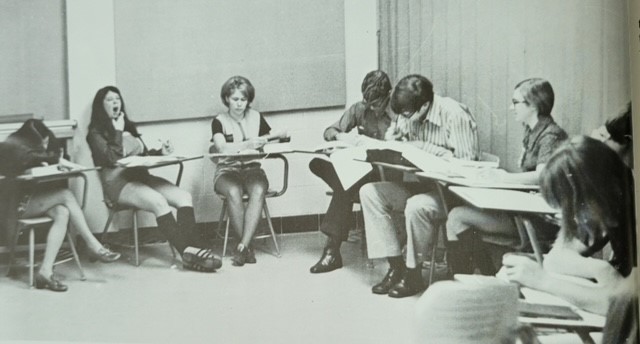 Tory: We did! Our class banded together for common rebellion. We went from required dress attire in 10th grade to blue jeans in 12th grade. Hippy mentality – some (not me) smoked with the teachers, pot in the bathroom, Viet Nam worries, importance of peers to survival.
Tory: We did! Our class banded together for common rebellion. We went from required dress attire in 10th grade to blue jeans in 12th grade. Hippy mentality – some (not me) smoked with the teachers, pot in the bathroom, Viet Nam worries, importance of peers to survival.
Laura, after the class graduated in 1972, did you stay in touch with any of the students?
Laura: Not for many years, but in 2007 I reconnected with Beth via a class website and have been in touch ever since.
Beth: I stayed in Charleston and had my children in my early 20s so by the time many of my classmates were starting families my children were becoming independent, so I had time. I became involved with the "designated" reunion organizers and slowly I became the one gathering information on classmates. I started using computers in the early ‘80s which were a great help for creating contact lists. I have organized several reunions for my year and two All Year Reunions for GWHS. I also maintain a Facebook group for the Class of ‘72.
So you are the glue that keeps the group together. I'm sure I speak for many readers in saying that I am grateful for the Beths in my life. Laura, what role did the Facebook group have in the formation of the book club?
Laura: In the spring of 2023 my husband died, and I included my student friends in the email announcement that I sent out about his death. Beth posted a message to the Facebook group with my email address.
Among the condolence messages was an email from Dennis, a student I had often wondered about. We started corresponding, particularly about books. One time I asked him, "Do you think anyone else in your class would like to talk about books with us?" He posted the question on the Facebook page, and we were amazed at the number of responses received, and that is how the GW72 Book Club began.
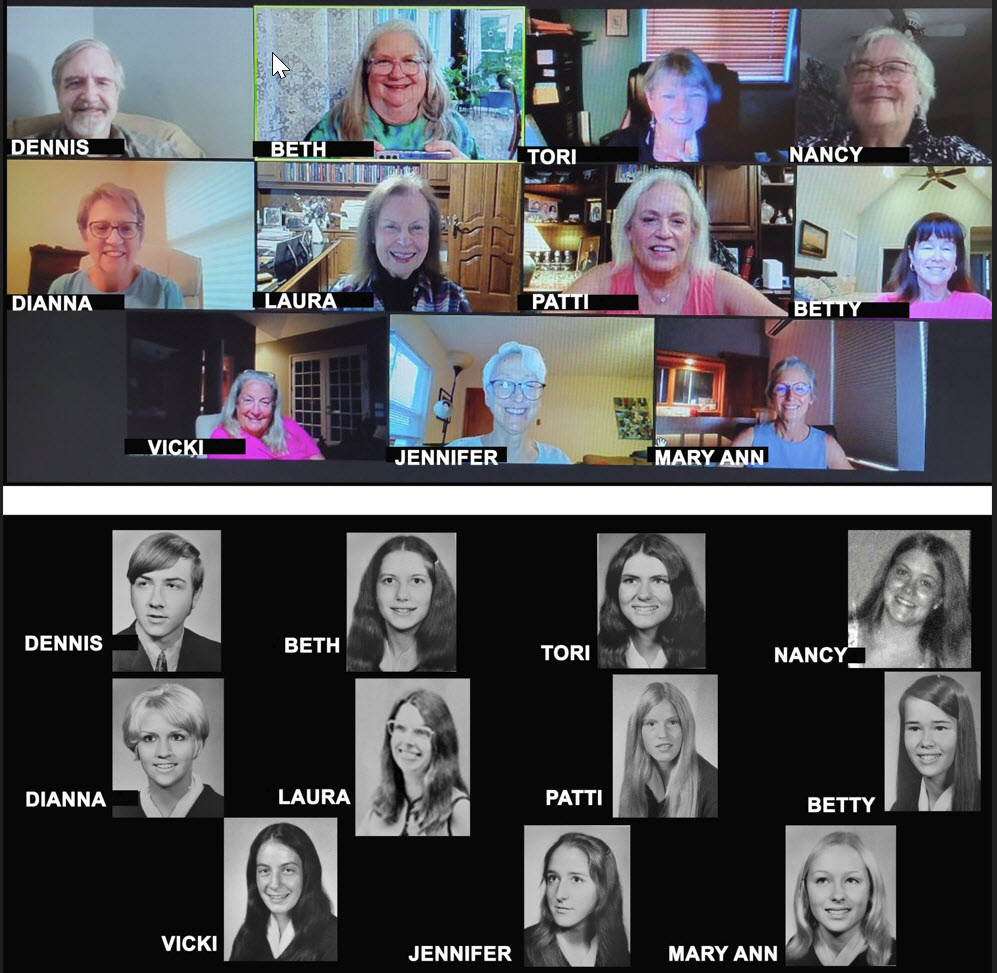 Dennis: I posted twice to the Class of '72 Facebook group. Each post was viewed by about 100 classmates and there was considerable interest, so I posted an invitation to come to an organizational Zoom meeting, and I also set up a club page on bookclubs.com. The GW72 Book Club currently has twenty-four members.
Dennis: I posted twice to the Class of '72 Facebook group. Each post was viewed by about 100 classmates and there was considerable interest, so I posted an invitation to come to an organizational Zoom meeting, and I also set up a club page on bookclubs.com. The GW72 Book Club currently has twenty-four members.
Laura: We had our first Zoom meeting at the end of October 2023 and we have continued to meet on the fourth Wednesday evening of every month except for December.
A question for "students," what drew you to join the book club?
Dianna: The bond we former students have with our teacher is what pulled us together. Other than The Canterbury Tales, I don't remember what we read in Senior English. But I do remember Laura as one who enjoyed teaching and was good at it. When the idea of this book club was broached, I knew I wanted to join because we would be led by a pro! I am touched that Laura (I still want to call her Mrs. Tabbara) remembers us and likes us enough to spend time with our book club.
Beth: The Class of '72 has always remained connected over the years but at reunions or on Facebook there is only so much you can talk about, basically surface stuff. Our book club allows us to all share and connect on a much deeper level through the books. Many of us have shared things we would NEVER have discussed at a reunion or over dinner.
What you describe, Beth, is a feeling that is shared by the vast majority of those in book group. I've interviewed more than a hundred groups over the years, and surveyed tens of thousands of individual members, and your sentiment is something I hear time and again. A question for anyone: What do you think it is about your book club that makes you comfortable sharing so openly, particularly given that your group is relatively new?
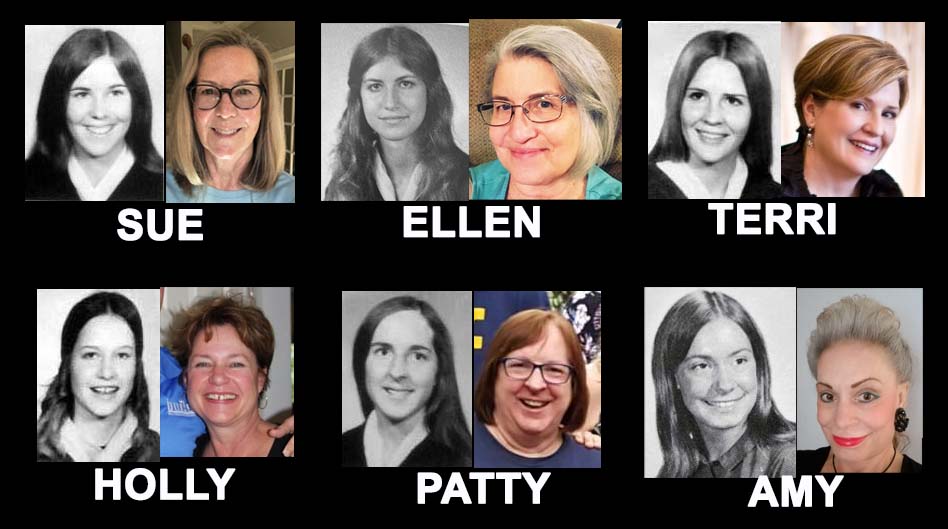 Holly: There are several reasons. One is simply our age! We've matured and are so much more than we were when we were all together in high school. Another is trust. Knowing people for as long as we've known each other brings a certain amount of trust that we may not necessarily have with newer friendships. I wasn't particularly close to the people in our group in high school. Of course we knew each other but we ran in different crowds. Terri is the one friend I've had since then and have kept in touch with. It is delightful to me to really get to know the others and have these wonderful conversations. I didn't expect the deep, sometimes intense subjects we discuss, such as racism and women's issues, and I'm not sure it would happen at this level without the implied closeness that we feel.
Holly: There are several reasons. One is simply our age! We've matured and are so much more than we were when we were all together in high school. Another is trust. Knowing people for as long as we've known each other brings a certain amount of trust that we may not necessarily have with newer friendships. I wasn't particularly close to the people in our group in high school. Of course we knew each other but we ran in different crowds. Terri is the one friend I've had since then and have kept in touch with. It is delightful to me to really get to know the others and have these wonderful conversations. I didn't expect the deep, sometimes intense subjects we discuss, such as racism and women's issues, and I'm not sure it would happen at this level without the implied closeness that we feel.
Terri: I like that not only are we all from the same high school, but that growing up in West Virginia definitely had a uniqueness that has stayed with most of us. It holds a special place in our hearts! With this in common, and adding the varied life experiences everyone has had since then, we have a bond that most groups don't have. I personally feel more comfortable being open with this group then I do in my "local" book groups that I have been in over the years in various locations. I have been thrilled to realize that in this group I feel more confident, knowing that what I say, or my opinion, will not end up being discussed in the "local gossip circuit".
Are all the members of the group from the same class?
Laura: The majority are, but we have some members from the Class of '73 and two who did not graduate from GW but who kept their ties to their class.
Nancy: Getting to be part of this book club is satisfying a long-held desire. Before my family moved away, I was part of the Class of '72 and was so looking forward to taking the Great Books class with Mrs. Tabbara because she had a wonderful reputation. She was SO cool, SO contemporary and fit right in with that 1970s motif of bell bottoms and long hair. I've waited 55 years to learn from her, and I am learning so much more than a literature class will ever teach me! She's Laura to me now, and her enthusiasm for reading is contagious.
Nancy, I'm so glad that your long wait is over – and clearly so worth waiting for! A question for those who took the Great Books elective with Laura, what impact did it have on you at the time, and did it have a longer-term impact on your life?
Mary Ann: My Great Books elective didn't jive with the chosen path that was encouraged in my family – I was focused on STEM (before it was named that) because everyone in my family was an engineer or chemist. Going to Great Books class was a respite since I was able to use my mind, instead of memorizing facts, and express my emotions stirred by our reading.
Unfortunately, I didn't take any literature courses in college so I didn't develop the art of reading to understand and calm myself during difficult times. When I got to my professional life, I was responsible for financial explanations and forecasts where being able to express the information in an inclusive and convincing way was key to my success since women were generally overlooked. The camaraderie practiced in our class and alternative ways to express information played into presentations once PowerPoint and other software became mandatory.
Patti: From the readings, my horizons were broadened, helping me grow as a person. I learned to think beyond the words as written, to delve into the deeper meaning and to apply the themes to the human condition. For example, I can vividly remember in sophomore year English Lit proclaiming that Shakespeare "wasn't conveying anything beyond an entertaining play." By the end of Great Books, I could see how wrong my outburst in class was.
Great Books made me a better critical thinker and less reactive in my personal and professional life. It taught me to look beyond what was said and to dive deeper into what was meant.
Your comments give me goosebumps. In honesty, I wish I had felt a connection to a teacher, any teacher, like you had. Laura, how widespread are the members of the group, and how many generally attend a meeting?
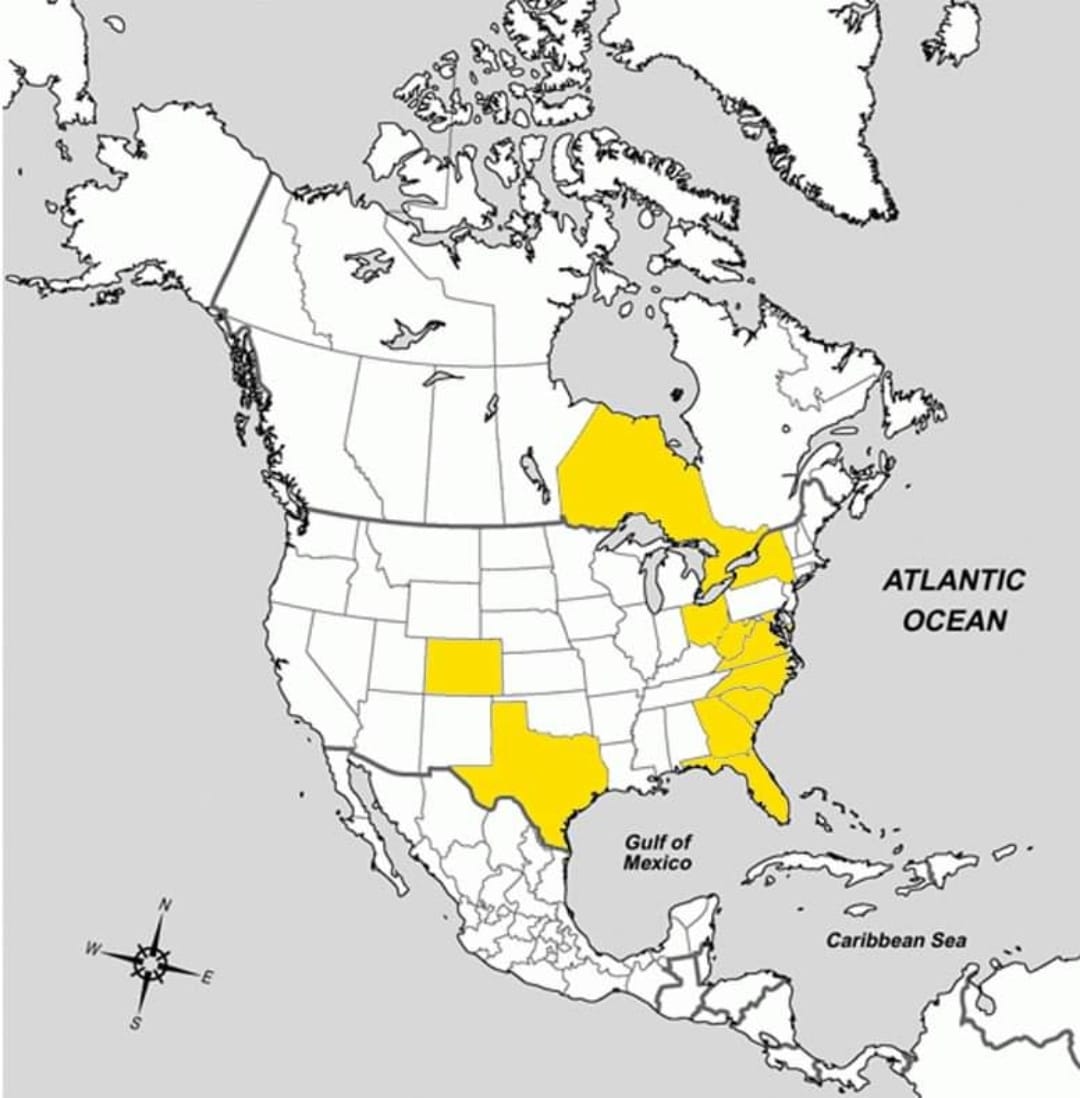 Laura: The former students are spread across ten U.S. states, and I live in Canada. We average around 14 participants, and sometimes our meetings last well over two hours with a reluctance to have the evening end. One time Tory dialed into our meeting from somewhere over the Pacific Ocean. She couldn't contribute, but she listened to the whole meeting. When Holly is at her home in the woods, she has to be outside to get connected. As the sun sets, her frame on Zoom becomes darker and darker until we can't see her, but we know she's with us.
Laura: The former students are spread across ten U.S. states, and I live in Canada. We average around 14 participants, and sometimes our meetings last well over two hours with a reluctance to have the evening end. One time Tory dialed into our meeting from somewhere over the Pacific Ocean. She couldn't contribute, but she listened to the whole meeting. When Holly is at her home in the woods, she has to be outside to get connected. As the sun sets, her frame on Zoom becomes darker and darker until we can't see her, but we know she's with us.
Would any other "students" like to share what the book club means to you?
Beth: While I was an avid reader in school, I hadn't read a book since Great Books. Life just kept getting in the way. This book club has renewed my love of books and combined them with our beloved teacher/friend Laura Tabbara and my classmates. It has been a blessing as we all enter our 70s together.
We are all joined by the times we experienced together; the music including the Beatles; the assassinations of John Kennedy, Robert Kennedy, Martin Luther King; the length of skirts: mini, midi, maxi; space exploration and walking on the moon; the sexual revolution; the Cold War and Viet Nam; birth control, LSD, Marijuana, women's lib. The list goes on and on.
While we are now separated by time and space, our hearts and minds are connected by the memories of the history we lived before the internet, social media and 24 hours a day of television. We share these common bonds that are becoming much stronger through reading and discussing the books we are reading together.
Patti: The group is providing me with exposure to different perspectives and opinions that I have found lacking since I retired. Additionally, the discussions push me to intellectually assess themes like social injustice, racism, discrimination, and anti-Semitism. I have also found it interesting to reflect on the resilience addressed in our novels and compare them to events occurring today.
Dennis: My unique perspective is as the lone male in a club of women. Sometimes I feel like a fly on the wall as I hear these amazing women discuss the challenges (and outright discrimination) they faced as women entering adulthood and joining the workforce in the 1970s.
Tory: I had a busy life and needed a diversion and to return to an earlier time. I wanted to get ideas for books that I otherwise would not have read and to reconnect with others from the past.
Tory, your comment about wanting to connect and read books that you otherwise wouldn't have done is shared by the great majority of book clubbers. What feels so special about your group is the shared connection; how the multiple threads of all your lives have come together meaningfully half a century later. Would anyone like to comment on this?
Dianna: It isn't as simple as meeting up with old classmates. It's also getting to know new friends, for we are in many ways different now. Life has reshaped us. There has been love, loss, success, and sorrow. Maybe this is the secret to why many of us in the Class of 1972 have stayed in touch and gathered over the years. We come together, not only as who we were, but also as we are now. In our book club, the books we read bring us closer together. Our life experiences allow us to connect to the stories in ways that our 17-year-old selves couldn't have, and our discussions connect us to one another in a way that class reunion cocktail parties cannot.
How do the dynamics of the book group compare to the classroom?
Dianna: The boundaries between student and teacher are mostly gone, but now and then Laura nudges us to think more critically – to delve into a character's motivations or identify recurring themes. The teacher imposes only one rule: if you come to book club, you must read the book.
Dennis: As far as class vs. book club, there are similarities and differences. In both, we sit in a group, sharing our ideas. The key differences that I see are that in the seminars in high school the books were divided into several discussions as we moved from cover to cover versus the book club where we discuss the entire book, and the classes were teacher led. By comparison, in the book club we rotate discussion leaders, and Laura tries to take the role of just another club member. In 1972, Laura was quite old – she was over 30, but we still trusted her.
"Quite old" makes me laugh, but I know what you mean; back then, Laura was not far off double your age, whereas now the age difference has essentially melted away. Does anyone else have thoughts on the group dynamics of the book club compared to classroom?
Dianna: Free from high school concerns about image and status, we openly share our thoughts and sometimes reveal very personal parts of our past. The discussions are rich, filled with humor and honesty. I think of it as high school English class 2.0.
Tory: We have more in common now – children, grandchildren. Relationships have a deeper meaning.
So, 55 years later, are you re-reading the Great Books?
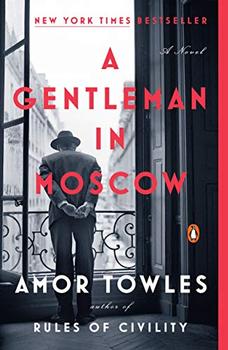 Laura: No Great Books so far. The first book we read I chose because it is one of my very favorites – A Gentleman in Moscow. I contacted Amor Towles to tell him about our unusual book club, and he sent greetings for our first meeting. That was a special surprise for the group. Since then, all members of the group have had a say in the book choices.
Laura: No Great Books so far. The first book we read I chose because it is one of my very favorites – A Gentleman in Moscow. I contacted Amor Towles to tell him about our unusual book club, and he sent greetings for our first meeting. That was a special surprise for the group. Since then, all members of the group have had a say in the book choices.
How do you select books?
Laura: We use our club page on bookclubs.com to suggest books we'd like to read. A few days before our monthly meeting, Dennis arranges for a poll where we vote on the book we want to read at our meeting two months hence.
What else have you read to date?
Laura: We have read a variety thus far. We enjoyed remembering The Wizard of Oz when we read Finding Dorothy by Elizabeth Letts, and Remarkably Bright Creatures led us to look at octopi in a different way. We've also read Horse by Geraldine Brooks, and were impressed by the grit and determination of The Boys in the Boat.
 When I mentioned that we should read a WWII book, Dennis suggested Spearhead by Adam Makos as he had a personal connection to one of the soldiers in the book. It proved to be a very difficult read for many as the horrors of war were vividly described, and we mourned the loss of so many very young men.
When I mentioned that we should read a WWII book, Dennis suggested Spearhead by Adam Makos as he had a personal connection to one of the soldiers in the book. It proved to be a very difficult read for many as the horrors of war were vividly described, and we mourned the loss of so many very young men.
From the 1940s, we moved back in time to the wealth, sophistication and secrets of The Personal Librarian; and next we're reading James McBride's, The Heaven and Earth Grocery Store.
I know that many book clubbers will be nodding along as they read through your selections to date, as they all have much to discuss. One last question for you Laura, what does the GW72 Book Club mean to you?
Laura: It has been a gift to me as I shed two important roles in my life last year, that of wife and caregiver, and now I am just Laura. How fortunate I am that at a time in life when some of my dear friends are departing this world that I should find a whole group of new "old" friends who make me think and laugh and give new purpose to my life; and all because of our love of books.
Beautifully put Laura; I wish you and all the members of the GW72 Book Club many more years reading together. Thank you!
BookBrowse founder, Davina Morgan-Witts chatted with Laura and the members of the GW72 book club in July 2024.
Your guide toexceptional books
BookBrowse seeks out and recommends the best in contemporary fiction and nonfiction—books that not only engage and entertain but also deepen our understanding of ourselves and the world around us.